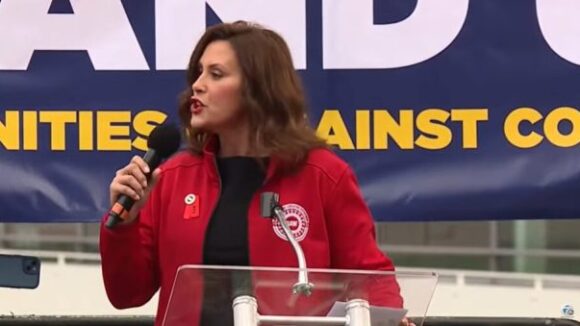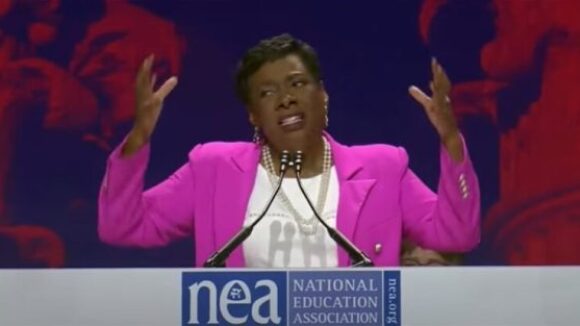Tyranny Triumphs in the Great Lakes State
Ignoring ample evidence of forced unionism’s unfairness and its damaging impact on jobs and incomes, Big Labor Michigan Gov. Gretchen Whitmer signed Right to Work destruction in 2023.
 West Virginia Union Bosses Twisting Facts About ‘Exclusivity’
West Virginia Union Bosses Twisting Facts About ‘Exclusivity’
(download the June-July 2016 NRTWC Newsletter)
Early last month, West Virginia union bosses informed the state attorney general and labor commissioner of their intent to sue to overturn S.B.1, the state Right to Work law adopted by legislators over the veto of union-label Gov. Earl Ray Tomblin (D) in February.
The union brass’s undisguised goal is to make it mandatory that employees who are subject to “exclusive” monopoly union bargaining bankroll the union in their workplace, even if they would never join it voluntarily.
“It is the longstanding position of the National Right to Work Committee that no employee should be forced to allow union officials to bargain over their pay, benefits, and work rules against his or her will,” said National Right to Work Committee President Greg Mourad.
Monopolistic Unionism ‘Reduc[es] Pay of the Most Productive Workers’
“That’s why,” he continued, “for decades, the Committee has advocated repeal of Section 9(a) of the National Labor Relations Act and all other federal and state employment-law provisions granting union officials either the power or the obligation to bargain contract terms for union nonmembers under any circumstances.
“But as long as Section 9(a) and other similar labor-law provisions remain in place,” Mr. Mourad continued, “policymakers at least should refrain from pouring salt in the wounds of employees whom union monopoly bargaining harms by forcing them to bankroll an unwanted union.”
Among the types of workers who often get paid less as a result of being subject to so-called union “exclusivity” are those who are especially talented and/or hard working.
In fact, over the years, a number of academic apologists for Organized Labor have made no bones about the fact that workers whose productivity is above-average typically get paid less when they are unionized. Take, for example, Richard Rothstein, a longtime research associate with the relentlessly pro-Big Labor Economic Policy Institute.
In a brief survey of union-friendly academic literature on the impact of “exclusive” union bargaining on the pay of employees with diverse levels of skill and industriousness, Mr. Rothstein has written:
“In [unionized] firms, wages of lower paid workers are raised above the market rate, with the increase offset . . . [in part] by reducing pay of the most productive workers. If firms with this practice are rare, competitors will be able to bid away their best workers.”
Unfortunately, for years, anti-Right to Work litigation filed on Big Labor’s behalf by union lawyers has ignored the facts acknowledged by union-friendly academics like Mr. Rothstein and pretended instead that all workers “benefit” from unionization.
Union Bosses Demand Taxation Power Over Workers
“Judging by press reports, lawyers for the Mountain State AFL-CIO and other unions plan to make the same false assumption, and insist that the West Virginia Constitution mandates that Big Labor have what amounts to taxation power over unionized employees,” said Mr. Mourad.
“Hence, union lawyers evidently intend to argue, West Virginia’s Right to Work law must go.”
In the recent past, union legal strategists have invoked very similar state constitutional arguments against Right to Work laws in Indiana and Wisconsin.
Similar Big Labor Claims Have Been Rebuffed in Court
“In 2014,” recalled Mr. Mourad, the Indiana Supreme Court unanimously overturned a lower court decision and upheld the constitutionality of the Hoosier Right to Work law.
“On the other hand, just this April a circuit judge in union boss-dominated Dane County unquestioningly accepted flimsy ‘compulsion is good for all’ contentions made by Wisconsin union lawyers and ruled against that state’s Right to Work law. It is widely expected that this factually challenged and lawless decision, which has since been stayed, will ultimately be overturned by the state Supreme Court.”
Mr. Mourad concluded: “Even if West Virginia AFL-CIO chief Kenny Perdue and his cohorts are handed a pliant circuit judge who will eagerly accept their claims, their anti-Right to Work lawsuit is very unlikely to prevail once it gets to the state Supreme Court.
“The fact is, state Right to Work laws have established a 70-year track record of successfully withstanding state and federal judicial attacks waged by Big Labor and its allies.”

Ignoring ample evidence of forced unionism’s unfairness and its damaging impact on jobs and incomes, Big Labor Michigan Gov. Gretchen Whitmer signed Right to Work destruction in 2023.

Largely thanks to the Right to Work attorney-won U.S. Supreme Court decision in Janus v. AFSCME, union bosses like NEA President Becky Pringle are no longer able to block virtually all meaningful education policy reforms.

Avelo employee Kim Howard believes all the firm’s flight attendants should get to vote on continued AFA rule. Credit: WTNH-TV (ABC,…